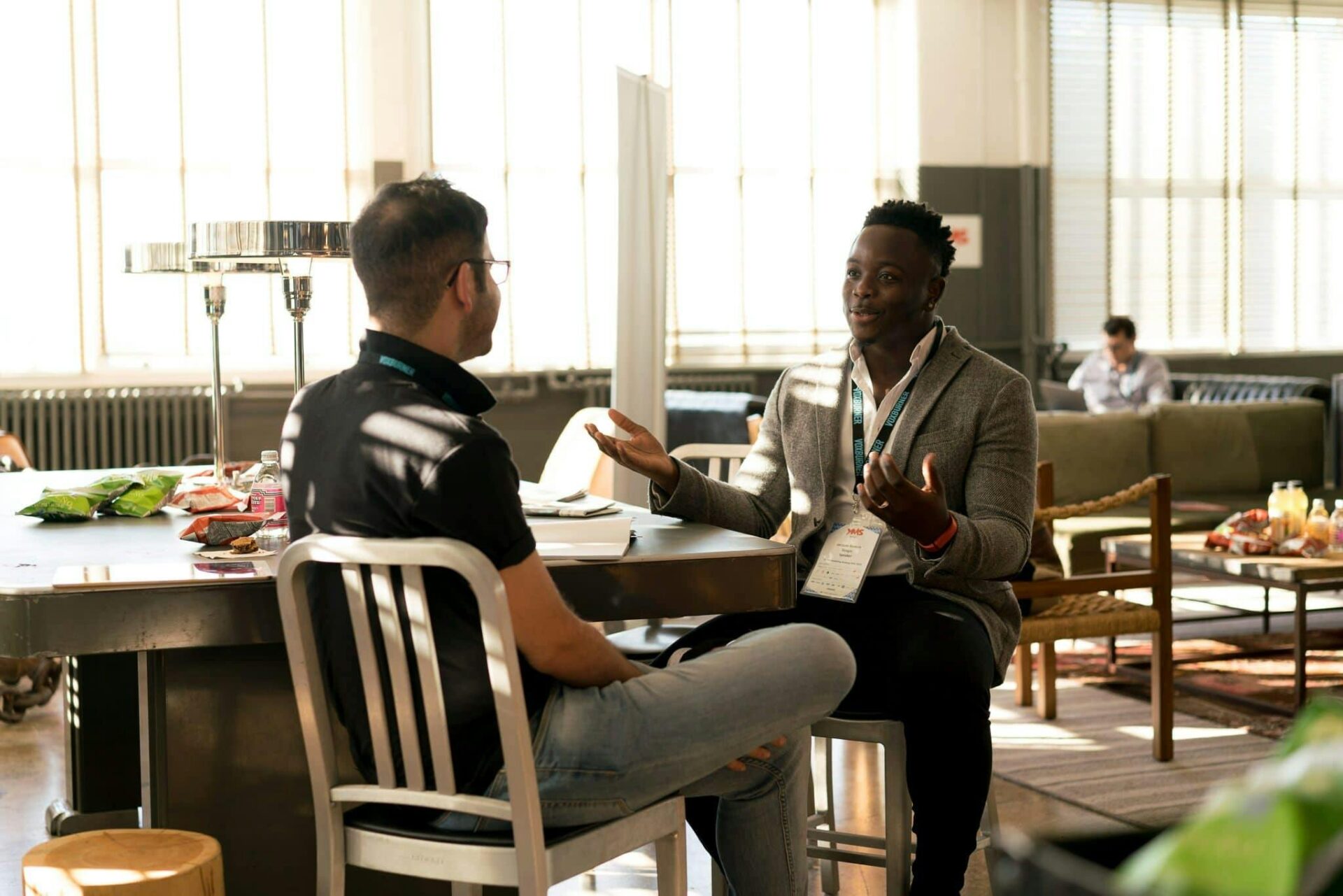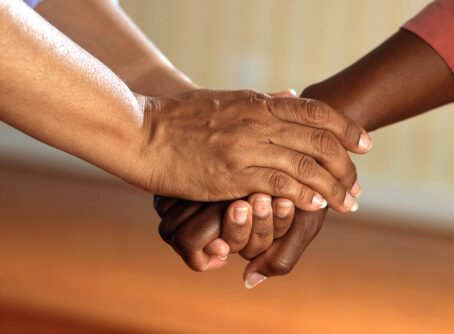
Welcome to the Academics Corner! CPJ’s ongoing series sharing the good work that Christian academics are doing to promote public justice from their research to the lecture hall.
EC: What is your connection to the Center for Public Justice?
JI: I first learned of CPJ through Jim Skillen who had been a part of the same church as me in Durham, North Carolina. Shortly after finishing my time practicing law in D.C., I participated in CPJ’s Civitas Program* in the summer of 2005. I’ve also known Stephanie Summers a long time and have collaborated with her on a number of different initiatives.
EC: This April, your new book, Learning to Disagree: The Surprising Path To Navigating Differences With Empathy And Respect will come out. It seems to me that this book is very timely, especially in an election year, when many are bracing for tough conversations about politics. It might seem like an easier option to not have that conversation at all. What would you say to students who are hesitant or afraid to talk about or engage with politics?
JI: Use judgment, prudence, and discernment. Sometimes the answer is to speak up and talk, and sometimes it’s not to talk. Figuring out when and why you should talk matters a great deal. You don’t have to fight every battle.
Sometimes there’s a sense in a classroom or in a public dialogue where you hear something that you don’t like and you feel like “Oh, this is my moment. I need to speak up.” When you feel that impulse, give yourself the time to think and discern whether you need to respond. Often the response doesn’t come immediately; it can come later, if it needs to come at all.
EC: In Learning to Disagree, you also talk about the various encounters you have had with students in the classroom. How can discussions in a law school classroom serve as a model for thinking about how we should interact with others in society when we find ourselves disagreeing?
JI: I think the key is working on building environments of trust where you can have those hard conversations. This is seldom going to work well in a big one-time lecture and certainly not on social media, but if you can get a deliberate and sustained environment with a relatively manageable size of people and have a discussion that unfolds over time with breaks in between, then you can build up trust.
Make this very practical and normal in your own life. Find three or four friends and commit to meeting with them for four to six sessions. Think of it like a book club.
I think you’ll find you can have a richer and more focused discussions when you have a smaller group of people, maybe with some food and drink. Encourage people to think, pray, read, and discern more deeply between sessions. Then, the next time you come back, you can get to even harder issues and over time, as you build trust, you can go much deeper than you would in an everyday encounter.
EC: It seems that some forms of engagement are more conducive to healthy discussions than others. You make the argument that it is possible for people to walk away disagreeing with another person’s view without thinking less of the other person. Why is it important for college students, law students, and young adults in general to understand and implement this practice? How do you see the prevalence of social media influencing the way we cope with disagreements?
JI: The reality is that most of us live, work, and play with people who hold very different views than we do, at least on a few things if not a lot of things. These are differences that matter deeply, and we might say they implicate profound and very serious moral and ethical questions.
If you really dug into your coworker’s or neighbor’s beliefs, you would discover some beliefs that you find really hard to understand or even deeply harmful. Yet you still find ways to live life with them in an everyday context. Part of the reason you’re able to do that is because you experience them holistically and three-dimensionally. You realize you both eat, sleep, and play as normal human beings.
You lose almost all of that on social media, which reduces the other person to a one-dimensional expression. Social media pulls on some of our worst impulses by reducing human beings to caricatures and encourages arguments without complexity.
EC: So social media is not a great tool for healthy discussions; what tools might you recommend for seeing someone as an image bearer and multi-dimensional?
JI: For Christians, this should be baked into our fundamental understanding of anthropology that people are created as image bearers.
There is a Tim Keller quote from The Meaning Of Marriage, which goes something like this: “You are more sinful than you’d ever imagine, but you are also more loved and redeemed than you’d ever imagine.” And that’s true for all of us. I think there’s a fundamentally Christian recognition of who we are as people in the world that prevents us from sorting the camps into good and bad.
People still have misguided, harmful and evil beliefs. We can criticize those beliefs and still recognize the humanity of the people who hold them.
EC: In your book you point out that unity does not depend on uniformity. This seems to tie in with the confident pluralism that you’ve written about before. Would you elaborate on the benefit and or necessity of pluralism to society?
JI: I would start with the recognition that pluralism is a reality of our world. It’s all we have to work with.
There are all kinds of risks, downsides, and dangers that come with pluralism. It leads to more instability and less unity and coherence around shared values.
But we have no choice except to respond to this reality. I suppose we could try to win at all costs and crush the other side. Or, third, we could figure out how to live with a diverse democracy, which means recognizing that the world around us will be a world of political compromise and uneasy coalitions.
EC: How does your Christian faith inform the way that you, as an academic, interact with and think about the law?
JI: My faith helps me recognize the real need for law in a broken and fallen world. I would much prefer a law ordered society to the alternative where there’s chaos, violence and power that dominate decision making and usually end up hurting the weak and vulnerable most of all. I think there’s a real value for law that Christians ought to see and affirm.
At the same time, we ought to recognize that the way law controls is ultimately through coercion, and really the threat of violence itself. So we should go in eyes wide open about what the law is and what the stakes of the law are. I tell Christian law students that this is a profession for a reason. The interpretations and skills that you’re learning in law school are going to help you interpret text that will sometimes be a matter of life and death for the people around you. That’s a pretty weighty role to take on. It needs to be taken deliberately and seriously, and treated with the significance that it demands.
EC: As a Christian engaging in the public square how do you do that without alienating people with different beliefs?
JI: I’ve found that it’s just helpful to be clear and upfront that I’m a Christian. I try to have the same engagement whether I’m speaking in a Christian only context or a more pluralistic context. I might use different linguistic resources or stories when I’m speaking with Christians, but I’m not going to have a message that is contradictory to what I would say to a non-Christian audience. I think that consistency across audiences is really important.
Some audiences have strongly held stereotypes about who Christians are. You have a real opportunity to challenge those stereotypes, not through your words, but through your actions: the quality of your work, the way you treat other people, and your engagement with others. It depends upon investing in relationships outside of your bubble.
EC: What advice would you give to young adults and college students who are thinking about going into the field of law?
JI: First, make sure you’re pursuing something that you really want to be doing. Law is a lot of reading and writing and research. It’s not for everyone, but I think it fits well with a certain mindset, disposition, and mentality.
At a practical level, take lots of writing courses and seminars where you’re going to get good feedback on your writing. Push yourself to become a better writer and to write more clearly. Learn to use fewer adverbs and to qualify your claims.
EC: In your book you talk about building the capacity for empathy and respect and how that’s crucial for learning to disagree. Do you have any advice for students who don’t know where to start building that capacity, or who might have a friend who has no desire to build that capacity for empathy or respect?
JI: Some of increasing your own capacity for empathy and respect is as straightforward as reading other sources and challenging your own beliefs. This is why college is such a great time to engage with your mind, and what it means to think deeply about arguments, even arguments to your own faith. I think Christians should be open to being challenged by the best possible arguments about their faith claims, and what it means to be a Christian in the world.
Do the hard work of reading deeply on specific policy and moral questions. You will usually find thoughtful perspectives on different sides of an issue. See if you can articulate the perspective that you don’t hold in a way that the other side would recognize and even embrace. You can still think a position is wrong or misguided. But you will have a better understanding of the people who hold views different than yours, and you will have a better understanding of your own beliefs.
EC: Is there a question that I should have asked you about your book or about your work that you would like to talk about?
JI: I wrote Learning to Disagree to be read with other people. The goal of the book is to make you think more deeply and empathetically. That’s best done in community.
John Inazu’s latest book is Learning to Disagree: The Surprising Path to Navigating Differences with Empathy and Respect (Zondervan). He is the Sally D. Danforth Distinguished Professor of Law and Religion at Washington University in St. Louis, the founder of the Carver Project and the Legal Vocation Fellowship, and a Senior Fellow with Interfaith America and the Trinity Forum.
Emily Fromke Crouch is the Program Director for Shared Justice, CPJ’s program for Christian college students and young adults that works to inspire and equip the next generation of leaders with the framework and tools needed for a sustained commitment to civic engagement and advocacy in their communities. Before joining CPJ she worked on Capitol Hill for four different U.S. senators. She is a graduate of Wheaton College (IL) and an alumna of the Falls Church Fellowship Program.
*The Civitas Program in Faith and Public Affairs was a program of Pew Charitable Trusts with Evangelicals for Social Action (ESA) and run by the Center for Public Justice. The program started in 1998 and was an outgrowth of the Crossroads Program on Christian Faith and Public Policy which hosted its first group cohort in 1992.






